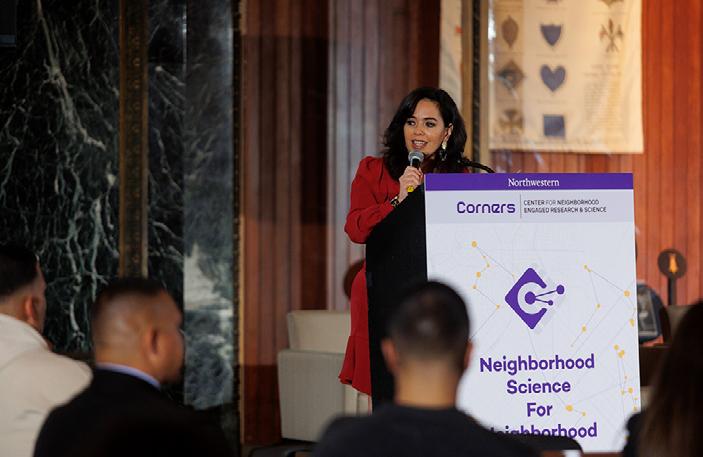
5 minute read
The History of Abortion Politics

IPR talks with IPR political scientist Chloe Thurston about politicians’ changing views on abortion
Even before the Supreme Court overturned Roe v. Wade, abortion remained one of the most polarizing issues among Democrats and Republicans, making it easy to predict politicians’ beliefs about abortion based on their political party. But that wasn’t always true.
A recent study by IPR political scientist Chloe Thurston and David Karol of the University of Maryland examines voting records of California state legislators from the 1960s–1990s to understand the growing ties between the Republican Party and the Christian Right and the Democratic Party and feminist organizations. The researchers show how legislators in California, one of the first states to pass legislation dealing with abortion, shifted from voting on abortion issues based on their religious beliefs to aligning with the emerging views of their political parties.
The following conversation has been edited for length and clarity.
IPR : What did you find when you looked at voting records of California’s elected officials on abortion between 1967 and 1996?
Thurston: We looked at voting in the California State Assembly before and after Roe v. Wade [in 1973]. In 1967, California became one of the first states to liberalize its abortion law with the passage of the Therapeutic Abortion Act. Before that, abortion was governed by the 1872 criminal code, which outlawed it except in order to save the life of the mother [about 30 other states had similar laws on the books by the 1960s]. The Therapeutic Abortion Act extended abortion access to cases where it would protect the physical and mental health of the mother, as well as in cases of rape and incest. Somewhat notably, it was signed into law by then-Governor Ronald Reagan, who would later change his position on abortion.
We examined voting patterns in the State Assembly, which is the lower house of the legislature. At the time that the bill was voted on, the partisanship of the individual legislators was not very predictive of their vote for or against legalization. The issue had not yet polarized along partisan lines. Instead, religious affiliation [namely, whether a legislator identified as Catholic or not] was more predictive. If you think about abortion politics now, if you know that someone in Congress or in a state legislature is a Democrat or Republican, you can predict pretty closely their position on the issue.
We found that over time the effect of religion waned as partisan affiliation came to supplant the role of religion in predicting abortion support. Some of this was due to incumbent politicians shifting their voting behavior, while retirement and replacement of older legislators with those who were more in-tune with their party’s position also played a role.
IPR : Can you talk about how interest groups played a role in shifting legislators’ views on abortion from aligning with their religious beliefs to those of their political party?
Thurston: When we were trying to understand how to characterize that shift, we examined multiple different possibilities. We ultimately emphasize this as a shift from legislators relying on personal background characteristics to decide how to vote, towards relying on the cues sent to them by groups that began aligning with each of the political parties over this time.
As interest groups with intense policy preferences on abortion aligned with political parties—feminist groups with the Democratic Party and evangelical religious groups aligning with the Republican Party—those groups helped to pull each party to a more cohesive and consistent pattern of voting.
Our theory is that [the interest groups] sent new cues to legislators about how they should be voting on that issue, where those cues were absent previously. At the time, of these first votes [in the legislature] prior to Roe v. Wade, abortion was a relatively new issue for voters and legislators, which may have given the latter some leeway in deciding how to vote. But as the issue develops over time, groups and parties may begin to send clearer signals about their policy positions.
IPR: One of the takeaways from your study is that the importance of personal background on a legislator’s vote can vary over time as the state of politics change. How do you see Ronald Reagan’s and Donald Trump’s shifts on abortion fitting into that idea?
Thurston: It is common for politicians to change their positions on issues. In addition to President Reagan’s reversal on abortion [he later said he made a mistake in signing the 1967 Act as governor], Trump also shifted from pro-choice to pro-life. Biden’s views and positions have also shifted on this issue, from supporting a pro-life constitutional amendment in the 1980s, to pro-choice views in recent decades. Abortion is not special in this regard. Many politicians that previously opposed same-sex marriage now support it. This points in some sense to the way that politicians are strategic actors, motivated by winning elections and willing to change their positions in pursuit of this goal. But people also just update their views over time, including by learning and experience. If their views are more in line with their constituents’, that may be seen as a positive from the standpoint of representative democracy.










